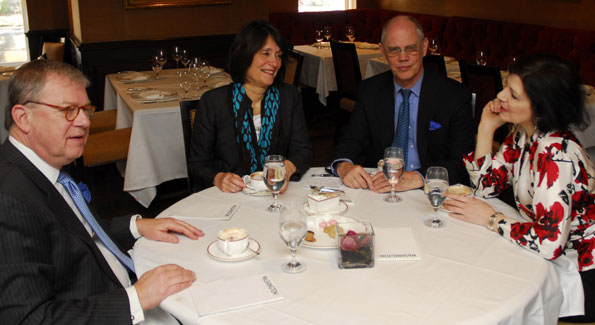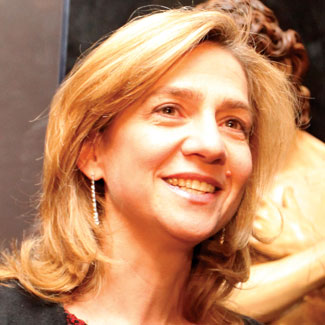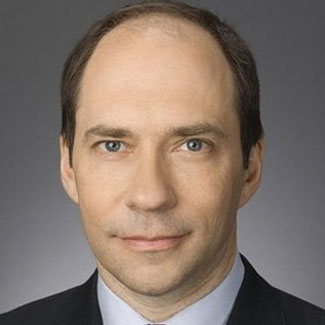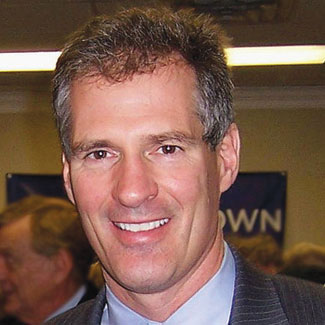Hidden away in the back of the Jockey Club, four clued-in journalists discuss the ins, outs, and dramatis personae of the Washington social “A-List.”

A-List lunching at the Jockey Club with (left to right): Michael Barone (The Washington Examiner), Susan Watters (Women's Wear Daily), Kevin Chaffee (Washington Life) and Roxanne Roberts (The Washington Post). (Photo by Kyle Samperton)
THE SCENE: A waiter silently scurries with a pre-lunch bottle of Nuits-Saint-Georges for a pair of European envoys as Georgetown doyennes Polly Kraft and Liz Stevens settle in with a friend in a plush and comfy booth at the Jockey Club.
KEVIN CHAFFEE: I think someone is “A-List” when they walk into a room and other people do a double take: “Oh, they are here.”
ROXANNE ROBERTS: It depends on the venue. If it’s political, people from the administration need to be there. At an arts or charity event, it’s their ability to write a big check.
SUSAN WATTERS: The person has to be nationally or internationally recognizable and have some degree of influence with regard to power, taste, or gathering people together.
MICHAEL BARONE: Nobody in Washington is doing what Katharine Graham used to do. She felt she had an obligation to put people together and made a point of befriending Nancy Reagan.
RR: She was the only person besides the president who could issue an invitation that no one would turn down. She mixed it up with political types but also people like Bill Gates and Warren Buffett. If someone was important enough to be invited, they became “A-List.”
SW: She had the advantage that no one would criticize her. Now it’s like a
DMV line out there because there is this New Millennium view that we live in a classless society. If you stick your head out you are going to get shot down. Look at what happened to Desirée Rogers.
RR: Desirée either didn’t know or didn’t care about the cultural norms of Washington and that caused problems for her.
KC: Is there a moral to the White House crashers story that became such an international media sensation?
MB: Part of it was that the visuals were so wonderful! The crashers were smiling with the vice president.
RR: The woman was encased around him.
KC: People were sticking flip-cams in Biden’s face to post Internet photos the same night. Once upon a time you’d meet the vice president, shake his hand from two feet away, and say, “Good evening, sir.”
MB: Oh well, he’s a touchy-feely sort of guy. Actually, he has never been a fixture of the Washington social scene because he took a train every night back to his family in Wilmington. Obama wasn’t a fixture either. He spent most of his career running for higher office.
RR: I’m hearing a fair amount of quiet grumbling and dismay that the Obamas have failed to engage with Washington outside of the White House. They have big events and wonderful photo ops but aside from that, the only thing they’ve done is go to Valerie Jarrett’s house three times for dinner.
MB: That’s the same as going to Chicago.
SW: When Ronald Reagan came to town he was known as the governor who had teargassed students. He helped himself a lot by going to Mrs . Graham’s house and by being very open to inviting everyone to the White House. Alice Roosevelt Longworth did a lot for Richard Nixon. Henry Kissinger used the social scene incredibly well. Jimmy Carter needed to use it but didn’t.
MB: I’ve heard that big Democratic contributors are no longer giving because Desirée Rogers didn’t put them on the White House social list.
SW: You can’t blame her. It’s the Obamas who didn’t put them on. The fish starts at the head.
MB: Bipartisan entertaining has been a lot harder in the last dozen years of culture wars politics.
RR: It continues to erode. The death of Ted Kennedy was a big deal. He was good at bringing people together. [Utah Republican Sen.] Orrin Hatch was one of his best friends. Some Republicans have told me that health care would have passed long ago because of the relationships he developed across the aisle.
SW: Don’t forget the journalists – because they can bring people together
from both sides.
KC: Fox News had Donald Rumsfeld in the same room with Jesse Jackson and Valerie Jarrett at the Radio and TV Correspondents Dinner this year. Apart from media moguls like Rupert Murdoch and Roger Ailes, who else can gather a so-called “A-List” here?
RR: Colin and Alma Powell are highly regarded permanent A-Listers with an ability to draw people from both parties when and if they choose.
SW: People at that level usually don’t use their capital that way. Those who did, like the late Evangeline Bruce for example, are very exclusive. They keep people out. Getting it all to work is a “Dance of the Seven Veils.” You can’t have a fundraiser or have it look like you want publicity.
MB: I am reminded of the old stories about having dinner at Joseph Alsop’s house. Somebody would make a negative remark about Gen. [George C.] Marshall and he would say, “You must leave immediately!”
KC: That would get around and the person became persona non grata.
MB: Christopher Hitchens’ parties for Vanity Fair after the White House Correspondents Association Dinner serve that function although his position institutionally is very much different from Mrs. Graham’s.
KC: The Kuwait Embassy confers a certain status if you get invited to their exclusive events.
SW: Rima Al-Sabah knows who is in and who the powers behind the throne are.
RR: The Al-Sabahs are the most active and visible diplomatic couple in
Washington and make more of an effort than any other embassy … although people also like to say they got an invitation from the British Embassy for dinner, and the French and Italians, too.
MB: This reminds me of the role that Sondra Gotlieb played when her husband Alan was the Canadian ambassador in the ’80s. They had policy
objectives, too, of course, like acid rain.
RR: One can never forget that many relationships here are “dinner party friendships,” not to be confused with genuine friendships.
SW: Genuine friends don’t come to your house when you are hosting a dinner in honor of the secretary of state. They understand that is a working event.
MB: Most presidents of the past 60 or so years have had no real friends in that sense: F.D.R., Eisenhower, Reagan. Harry Truman’s wife spent half of his presidency back in Independence, Mo., with her old battle-axe of a mother.
RR: Being very powerful is like being very rich. It is difficult to make new friends.
KC: Who are the newer A-List faces in town?
RR: Sen. Al Franken is a celebrity/politician who has a lot of show biz stories and is very clever. He’d be a great guest at a dinner table.
KC: I’m not so sure about that. The night Sen. Scott Brown got elected I saw him at the Japanese Embassy residence paying far more attention to his Blackberry than the ladies seated beside him.
RR: Franken and Brown are the new “It Girls,” just like the Hollywood stars who have always been in the spotlight and capture the imagination. If they’re smart they’ll leverage that to do what they want to do and become serious players. Vicki Kennedy could play a Pamela Harriman type role if she wanted to. And any Supreme Court justice always creates a buzz. If Clarence Thomas shows up anywhere, it’s a big deal.




